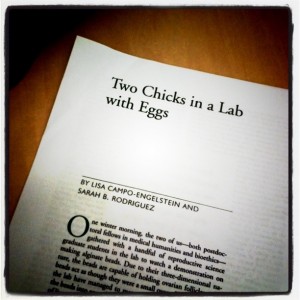 The Oncofertility Consortium was developed with the insight that a multidimensional approach would be required to solve the intractable problem of fertility loss in young cancer patients. By bringing together individuals with diverse backgrounds in basic science, the humanities and the social sciences, we could provide more comprehensive cancer care to young patients and better equip them with options for starting a family in the future. This engagement has been beautifully illustrated in a recent article written by Lisa Campo-Engelstein, PhD and Sarah Rodriguez, PhD entitled, “Two Chicks in a Lab with Eggs,” which describes some of their experiences as senior research fellows at the Oncofertility Consortium.
The Oncofertility Consortium was developed with the insight that a multidimensional approach would be required to solve the intractable problem of fertility loss in young cancer patients. By bringing together individuals with diverse backgrounds in basic science, the humanities and the social sciences, we could provide more comprehensive cancer care to young patients and better equip them with options for starting a family in the future. This engagement has been beautifully illustrated in a recent article written by Lisa Campo-Engelstein, PhD and Sarah Rodriguez, PhD entitled, “Two Chicks in a Lab with Eggs,” which describes some of their experiences as senior research fellows at the Oncofertility Consortium.
Both Lisa and Sarah agree “putting scientists and humanists ‘on the same team…’ established a level of camaraderie and trust from the get-go, thereby allowing professional relationships and projects across disciplines to flourish.” What makes their experience unique, and I think, more substantial, is that Sarah is a historian and Lisa is a philosopher – neither are scientists, although they both worked in the Woodruff Lab. Their fellowships were part of a burgeoning academic movement that approaches education and learning from a multidisciplinary standpoint.
The idea that we can benefit from interdisciplinary work is not a new one, but the practice of actually seeing it done is relatively new and the results speak for themselves. Engaging in this kind of learning experience can only enhance our understanding of how other disciplines produce knowledge, which in turn changes how we produce knowledge in our own fields. In Sarah and Lisa’s experience, they stated that “by being embedded in the lab, we both learn[ed] more about reproductive science and enable[d] scientists in the lab to think about their work away from the bench.”
Even though the concept of knowledge exchange seems like a win-win for everyone, it doesn’t remove the stigmas we sometimes harbor for “other” disciplines. I myself worried how I would fit into this “scientific” community when I began working at the Consortium, but in the few short months I’ve been here, my perception of scientific work has changed and my own base of knowledge has grown. Sometimes you just have to jump into the unknown head first and do so with an open mind and a willingness to learn. You’ll soon find that we all have something to learn from each other. To learn more about Lisa and Sarah’s experience as fellows at the Consortium, click here to read their article, “Two Chick’s in a Lab with Eggs.”

